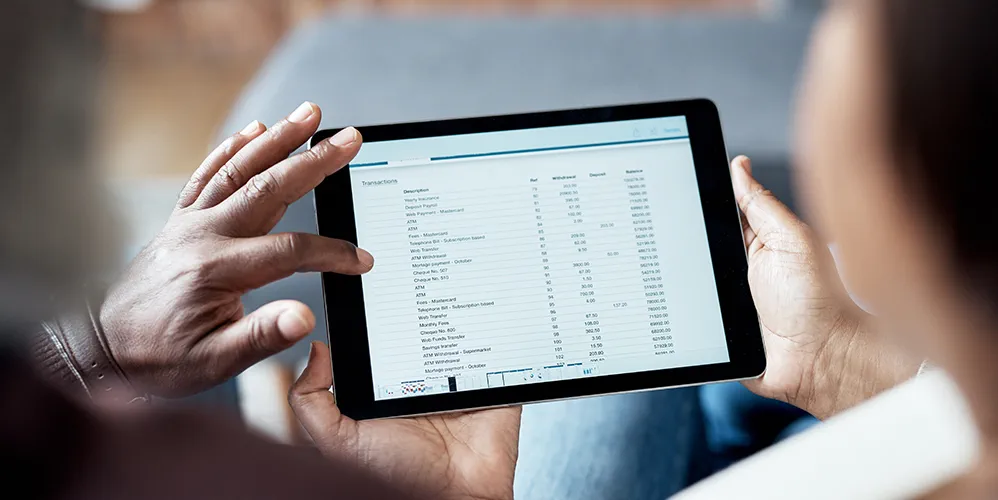
What is NEFT? A Complete Guide to National Electronic Funds Transfer
09 Oct 2024

Table of Content
What is NEFT?
Now, you might be wondering, “what is neft fund transfer?”. NEFT full form in banking refers to National Electronic Funds Transfer. It is a widely used electronic funds transfer system in India. It enables individuals and businesses to transfer funds from one bank account to another seamlessly. The system is managed and regulated by the Reserve Bank of India (RBI), providing a secure and efficient means of transferring money. NEFT transactions typically involve the sender's and recipient's bank branches, and customers can initiate transfers through various channels such as online banking, mobile apps, or by visiting their bank branch. It has become an integral part of the Indian banking system, facilitating quick and reliable interbank transactions.
How does NEFT work?
NEFT operates on the deferred net settlement (DNS) basis, where transactions are processed in batches, with transactions settled at specific intervals throughout the day, ensuring efficient fund transfers between banks. This electronic system has streamlined interbank transactions, offering customers a convenient and reliable means of transferring money across different financial institutions in India.
The process involves the following steps:
Initiation :
To begin an NEFT transaction, the sender provides essential details such as the beneficiary's account number, bank branch , and the transfer amount. This can be accomplished through various channels, including internet banking, mobile banking, or by visiting a bank branch.
Beneficiary Addition :
If the beneficiary is not already added to the sender's account, the sender needs to add the beneficiary's details (account number and bank branch) as a one-time process. This ensures smoother future NEFT transfers to the beneficiary.
Transaction Processing :
After initiation, the sender's bank forwards the transaction details to the NEFT clearing center. At this center, transactions from various banks are organized and batched for processing.
Settlement :
NEFT transactions are settled in hourly batches throughout the day. The clearing center processes these batches and sends settlement files to the respective banks.
Fund Transfer :
Upon receiving the settlement files, the beneficiary's bank credits the funds to the beneficiary's account. This typically occurs on the same day or the next working day, depending on the timing of the transaction.
Confirmation and Tracking :
Both the sender and the beneficiary receive confirmation messages or notifications from their respective banks upon the successful NEFT transfer. This ensures transparency in the transaction. Additionally, the sender can track the status of the NEFT transaction through their banking channels.
Also Read: Mobile Banking - Benefits, Features & How to Get Started
How much time does it take for NEFT Transactions to Settle?
NEFT services operate 24/7, including holidays, with transactions settled in 48 half-hourly batches each day. The initial batch starts at 12:30 AM, concluding at 12:00 AM the following day. This batch settlement approach is designed to enhance efficiency and reduce NEFT transaction times, providing users with greater convenience. It’s important to highlight that NEFT transactions conducted during regular banking hours are regarded as automated transactions initiated through 'Straight Through Processing' (STP) modes by the banks.
Factors Affecting NEFT Settlement Time
NEFT (National Electronic Funds Transfer) is a widely used electronic funds transfer system in India. The settlement time for NEFT transactions can be influenced by various factors. Here are some key factors that can affect NEFT settlement time:
Cut-off Timings :
NEFT transactions are processed in batches at specific cut-off timings set by the Reserve Bank of India (RBI). Transactions initiated before the cut-off time are processed on the same day, while those initiated after the cut-off time are processed on the next working day.
Bank Operational Hours :
Each bank may have its operational hours, and NEFT transactions are typically processed during these hours. Transactions initiated outside the operational hours may be queued for processing in the next available batch.
Technical Glitches :
Technical issues, such as system downtimes, connectivity problems, or other glitches in the bank's infrastructure, can impact the settlement time for NEFT transactions.
RBI Guidelines :
Changes in RBI guidelines or policies related to NEFT can impact on the settlement process. Banks need to adhere to these guidelines, and any updates may lead to adjustments in settlement procedures.
When can you Make NEFT Transactions?
Generally, NEFT services are available 24x7 all year round. The specific operational hours may vary between banks, so it is advisable to check with your bank on the same.
Also Read: What is Meant by Internet Banking and How Does It Work
The Advantages and Disadvantages of NEFT Payments
Advantages of NEFT Payments:
- NEFT provides a convenient way to transfer funds electronically, allowing users to initiate transactions from the comfort of their homes or offices.
- NEFT operates on a 24x7 basis, allowing users to schedule transactions at any time, even outside regular banking hours.
- NEFT transactions are generally more cost-effective compared to other forms of electronic transfers, especially for large sums of money.
Disadvantages of NEFT Payments:
- NEFT transactions are not instantaneous; they are typically processed in batches, which can lead to delays in fund transfers, especially for time-sensitive transactions.
- Both the sender and the recipient need to have accounts with banks that are part of the NEFT network. If one of the banks is not part of the system, the transaction cannot take place.
- Unlike Immediate Payment Service (IMPS) or Unified Payments Interface (UPI), NEFT does not provide immediate confirmation of the transaction status. Users may need to wait for a few hours to receive confirmation.
In conclusion, understanding the time it takes for NEFT settlements involves considering batch timings, the efficiency of participating banks, and the day of the week. While NEFT settlements typically occur within two hours of the batch in which the transaction was initiated, advancements in banking technology have paved the way for 24x7 NEFT operations, providing users with more flexibility and convenience. It's crucial for users to stay informed about the latest NEFT timings and features offered by their respective banks to make the most of this efficient electronic fund transfer system.
Also Read: IFSC Codes: What They Mean, How to Find & How Does It Affect Banking?
FAQs
Q: How long does it take for a NEFT payment to settle?
A: NEFT (National Electronic Funds Transfer) payments typically settle in batches of half an hour, although the exact time can vary depending on the respective bank's processing schedule and the time of initiation.
Q: How can I check my NEFT settlement status?
A: You can contact your bank's customer service or use their online banking portal to track the status of your NEFT transaction.
Q: Does NEFT work 24 hours?
A: Yes, NEFT works 24x7 all-year round.
Q: Are NEFT done on national holidays?
A: Yes, NEFT transactions can be done online on National Holidays.
Q: How do I know if my NEFT is credited to the beneficiary?
A: You can track the status of your NEFT transaction by checking your bank statement or online banking portal.
Q: Are there any limits on the amount that can be transferred through NEFT?
A: Yes, NEFT transaction limits vary among banks, but generally, there is no upper limit for NEFT transactions. However, some banks may have daily or per-transaction limits for security reasons.
Q: Are there any charges associated with NEFT transactions?
A: Yes, some banks may impose nominal charges for NEFT transactions. It is advisable to check with your bank for specific details on NEFT charges.
Q: Can I schedule NEFT transactions for a future date?
A: Yes, many banks allow customers to schedule NEFT transactions for a future date through their online banking platforms.
Q: Can NEFT transactions be initiated through physical channels like bank branches?
A: Yes, NEFT transactions can be initiated through physical channels like bank branches.
Q: What are the factors that may cause delays in NEFT settlement?
A: Delays in NEFT settlement can occur due to factors such as technical issues or cut off times. Incomplete or incorrect beneficiary details may also lead to processing delays.
Popular Articles
Tag Clouds
Related Articles






IMPS in Banking – Full Form, Features, Transaction Limit, Charges & how it works



Unlocking Financial Efficiency: How Cash Management Services Transform Banking

-
Disclaimer
The contents of this article/infographic/picture/video are meant solely for information purposes and do not necessarily reflect the views of Bank of Baroda. The contents are generic in nature and for informational purposes only. It is not a substitute for specific advice in your own circumstances. Bank of Baroda and/ or its Affiliates and its subsidiaries make no representation as to the accuracy; completeness or reliability of any information contained herein or otherwise provided and hereby disclaim any liability with regard to the same. The information is subject to updation, completion, revision, verification and amendment and the same may change materially. The information is not intended for distribution or use by any person in any jurisdiction where such distribution or use would be contrary to law or regulation or would subject Bank of Baroda or its affiliates to any licensing or registration requirements. Bank of Baroda shall not be responsible for any direct/indirect loss or liability incurred by the reader for taking any financial decisions based on the contents and information mentioned. Please consult your financial advisor before making any financial decision.
IMPS in Banking – Full Form, Features, Transaction Limit, Charges & how it works
Banking services are constantly evolving making services like sending and receiving money online through the banking app or net banking common these days. Available seamlessly for customers round the clock particularly when it comes to money transfer, gone are the days of tokens and teller counters even when transferring high-value funds. No longer are you expected to fill out withdrawal and deposit slips and wait for your turn when your token number is flashed, thanks to Internet banking life has become so much smoother and easier. Not just transferring money but ordering food, groceries, and utility items from the app or internet banking, IMPS will initiate quick payment.
What is MICR Code? Understanding its Role in Banking Transactions
If you have used or even seen a cheque book, you must have noticed a few code numbers located at the bottom of every cheque leaf. This is a unique code for only bankers to decode and it plays an important role in banking transactions. This code is known as the Magnetic Ink Character Recognition (MICR) Code. Through this blog, you will get a thorough understanding of what an MICR Code is and its purpose in banking.

